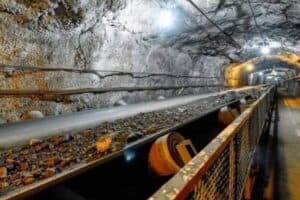Much of South Africa's wealth is built on its mines, but the sector is shedding jobs fast -- setting the government a tough task to tackle record national unemployment ahead of this year's election.

At this week’s annual Mining Indaba, the world’s largest mining conference, in Cape Town the question of how to exploit deposits and create jobs has been one of the talking points among mining firms, investors, trade unions and government figures.
“One thing we must understand about mining is that it is a depleting resource. Mining is not like Coca-Cola where you just mix water and syrup,” Mines Minister Gwede Mantashe said as he opened the four-day event.
“In mining, there’s a deposit, it is finite and you mine it until the end. You are not going to create jobs in the same plant.
“(But) you can create an environment for growth of foreign investment, and I think we are doing that.”
South African President Cyril Ramaphosa, a wealthy former trade union leader and mining executive, came to power a year ago vowing to improve the country’s investment climate after the scandal-tainted rule of his predecessor Jacob Zuma.
“We will not be able to meaningfully reduce unemployment and poverty without increased investment particularly in… mining,” Ramaphosa told the conference.
At their peak in the late 1980s, South Africa’s mines employed about 760,000 people, according to government figures, with the number dropping to just over 450,000 last year.
The ruling African National Congress (ANC) party could be punished in the May elections as unemployment sits at record highs of near 28 percent.
– New deposits? –
Mantashe optimistically suggested that new deposits and new technology offered hope for miners in mineral-rich South Africa, which has a long history of gold, diamond, platinum, coal and manganese exploration.
“Our hope is that as we discover new deposits, there will be interested investors because when those investors open those new mines then you will absorb jobs that are lost somewhere else,” he said.
“The question of technological change in the industry is a new factor.
“We are not going to create the same type of jobs, the likelihood is that we are going to create new types of jobs.
“The industry… must position itself to be part of change.”
The department of mineral resources said 11 new mining licences had been granted last year and those would also contribute to job creation.
Analysts painted a less rosy picture for the sector, which has hemorrhaged jobs due to weakened commodity prices and rising operational and labour costs.
“We believe the key factors are increased mining complexity (depth, quality) and labour union demands,” Renaissance Capital’s mining analyst Johann Pretorius told AFP.
“South Africa has significant unexploited resources, but the labour is uncompetitively expensive.
“Largely as a result of our expensive labour, we believe our precious metal sector may shrink over the next decade.”
– Investment obstacles –
Pretorius added that major blocks on investment included regulatory uncertainty, and security of tenure after Ramaphosa backed forced land redistribution.
The policy of “expropriation without compensation” is aimed at tackling apartheid-era inequality and attracting landless black voters, but has alarmed many foreign investors.
Underlining the challenges, the Congress of South African Trade Unions (COSATU) announced it would hold a national day of protest on February 13, calling on its 1.6 million members to down tools.
“The strike will be about fighting against the ongoing job losses that are taking place across all the sectors of the economy,” the union said.
South Africa has been moving towards integrating automated systems into mine operations — fuelling fears that new technology will further strip away at workforce numbers.
But John Welborn, CEO of Australia’s Resolute Mining company, called on the industry to embrace technology as a creator of jobs.
“I don’t believe that it is as big an issue as people imagine,” he said.
Resolute has operations in Mali and Ghana where it is building a new fully automated gold mine.
Welborn said the mine would disprove “the idea that we are going to get a robot and no one is going to get a job”.
“I am absolutely convinced that technology allows you to interact and employ local workers in higher level management positions and take ultimate control of the mine.”






